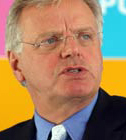Marsupial manoeuvres
With the UK Competition Commission due to report next week provisional findings from its investigation into Project Kangaroo, Jonathan Webdale charts the development of the BBC, ITV, Channel 4 on-demand joint venture.

 It all seemed like such a good idea at the time. It was early 2007 and online video was beginning to boom. Apple was already shifting millions of TV episodes through iTunes, YouTube had been snapped up by Google and excitement was building around something called the Venice Project.
It all seemed like such a good idea at the time. It was early 2007 and online video was beginning to boom. Apple was already shifting millions of TV episodes through iTunes, YouTube had been snapped up by Google and excitement was building around something called the Venice Project.
In the UK, Channel 4 had recently launched 4oD, while over at the BBC only a few regulatory hurdles remained in the way of a debut for the corporation’s long-awaited iPlayer. Plans were being drawn up in parallel for a commercial version via BBC Worldwide (BBCWW) and ITV was preparing to make its own moves.
Freeview, the UK digital terrestrial platform from the BBC, ITV, Channel 4, Five and BSkyB, had just celebrated another bumper Christmas, so it was only natural in this climate that discussions turned to a similar collaboration for broadband.
The idea for Project Kangaroo came from BBCWW. Following a lower than hoped-for licence fee settlement from the government, the division was under pressure to deliver increased revenue and a target was set for 10% of this to come from digital.
The opportunity was there and it was clear that if the UK’s leading broadcasters weren’t prepared to band together to lead the evolution of television, then a string of start-ups were waiting in the wings to do so, not to mention a growing pirate collective.
So BBCWW approached Channel 4 to present the Kangaroo proposal. ITV was also invited and over the following months, as the project developed, it was variously in and out as it dealt with more pressing internal challenges.

 But essentially everything seemed to be going well. Kangaroo even managed to lure away Ashley Highfield (left), the BBC’s long-serving director of future media and technology, to become its CEO in April this year.
But essentially everything seemed to be going well. Kangaroo even managed to lure away Ashley Highfield (left), the BBC’s long-serving director of future media and technology, to become its CEO in April this year.
But on June 30, the day before Highfield was due to start his new role, Kangaroo was dealt a major blow. The UK’s Office of Fair Trading (OFT) decided to refer what was now a joint venture between BBCWW, ITV and Channel 4 to the Competition Commission.
ITV executive chairman Michael Grade (below) immediately rounded on the move, which essentially meant Kangaroo would miss its planned autumn 2008 launch and was on hold until at least December 14, when the commission was due to report back.

 “This venture has been delayed by a reference to the Competition Commission, at the very same time that non-UK companies like Google and Apple are free to build market-dominating positions online in the UK without so much as a regulatory murmur,” complained Grade.
“This venture has been delayed by a reference to the Competition Commission, at the very same time that non-UK companies like Google and Apple are free to build market-dominating positions online in the UK without so much as a regulatory murmur,” complained Grade.
But the wheels of legislative machinery were already in motion and a month later another screw came loose when the commission said Kangaroo’s founders hadn’t been able to supply it with the required information and so its conclusions would be delayed till mid-January. In October, the date was pushed back again to February 8.
By this time the continual impediments to Kangaroo’s progress appeared to be taking their toll. BBCWW head of technology Douglas Glen, who was instrumental in the project’s inception, had left to take up a new role at Andrew Lloyd Webber’s Really Useful Group. ITV’s lead Kangaroo project manager Patrick Ugeux (below) also exited, to join Chellomedia.
Meanwhile, the body of opposition was building. Endemol, FremantleMedia and IMG Media held talks behind closed doors to share their concerns. A series of scathing complaints from parties including BSkyB, Virgin Media, BT Vision, Tiscali, Joost, Arts Alliance Media and producers’ trade group Pact seeped into the public domain as the Competition Commission released the submissions it had received.

 Then came the sucker punch: Highfield quit to become MD and VP of consumer and online at Microsoft UK. The man who had taken to the stage with Bill Gates in Las Vegas in March 2005 to show what a version of the BBC iPlayer would look like optimised for Windows Vista, jumped ship to the software giant.
Then came the sucker punch: Highfield quit to become MD and VP of consumer and online at Microsoft UK. The man who had taken to the stage with Bill Gates in Las Vegas in March 2005 to show what a version of the BBC iPlayer would look like optimised for Windows Vista, jumped ship to the software giant.
But all this is history. Right now Kangaroo is without a figurehead and is awaiting preliminary findings from the Competition Commission enquiry, expected some time around the end of November. From the outside it seems like the project is on the ropes but interim CEO Rod Henwood (below) says far from it, and round one hasn’t even begun.
“While Ashley going to Microsoft for a massive job is not what anybody would have particularly wanted, the truth is there’s continuity at all levels. I’m not a novice in this; I’ve run bigger businesses than Kangaroo,” says Henwood.
Positions he has previously held include MD of Central TV, MD of Fox Kids UK, NTL’s director of TV, CEO of Premium TV, and latterly new business director at Channel 4, where he launched 4oD and was involved in negotiating the terms for Kangaroo from the outset, later chairing its board.

 He gave up the chairman’s role when he left Channel 4 in April but continued working with Kangaroo in an advisory capacity, one that suddenly gained greater urgency when the OFT determined that the concentration of BBC, ITV and Channel 4 content in one place gave rise to competition concerns.
He gave up the chairman’s role when he left Channel 4 in April but continued working with Kangaroo in an advisory capacity, one that suddenly gained greater urgency when the OFT determined that the concentration of BBC, ITV and Channel 4 content in one place gave rise to competition concerns.
Some sources close to Kangaroo claim the founders never gave serious consideration to the idea that that OFT might take this view and ignored warnings that the likes of BSkyB, Virgin Media and BT would have “armies of lawyers” who would try their best to kill the project. This is something Henwood flatly denies.
He is unable to comment on the ongoing process itself or what concessions Kangaroo’s founders may be asked to make, but the main complaint against the venture is its plan to be the sole digital syndication agent for the BBCWW, ITV and Channel 4 programme libraries.
“It is a concern to have the three largest content owners in a monopolistic position in a country like the UK. I think the Competition Commission will make their own judgement on that,” says Mike Volpi (below), CEO of Joost.

 He adds, however, that if the commission doesn’t come up with the kind of remedies that would make trading in the UK favourable for Joost, it wouldn’t harm the start-up as much as other platforms for whom the territory is their sole trading ground.
He adds, however, that if the commission doesn’t come up with the kind of remedies that would make trading in the UK favourable for Joost, it wouldn’t harm the start-up as much as other platforms for whom the territory is their sole trading ground.
Sky, Virgin and BT have been speaking in uncharacteristic harmony on the subject of Kangaroo, but some claim these are simply the gripes of firms that have failed to grasp the internet by the horns and come up with their own effective on-demand solutions.
“If you’re going to talk about competition right now, YouTube has 85% of all online video that’s served in the UK and Apple iTunes accounts for over 80% of all TV shows downloaded, so the broadcasters aren’t the big guys in this space,” says Arash Amel, senior analyst and head of broadband media at research firm Screen Digest. “The internet isn’t national, it’s global, and the threat is from global companies.”
Some of these appear to be cosying up to Kangaroo. FutureMedia broke the news at the end of October that Hulu co-founders NBC Universal and News Corp had been in talks about joining forces with the project as a means of entering the UK.
Dan Fawcett, president of News Corp subsidiary Fox Digital Media, said discussions had taken place about a partnership but these had stalled due to Kangaroo’s ongoing legal wrangles. “Early on, we were talking about some way of coming together, but right now I don’t know what the status is with the regulatory process,” Fawcett said.
“It was easy for us and NBC to come together here (in the US) because we’re two dominant players in content. With Kangaroo, we’ve got the three major content owners in the UK, so it’s hard for us to come in and do something on our own and get traction.”
Although representatives from BBCWW and Fox afterwards played down Fawcett’s comments, since the Competition Commission enquiry prohibits Kangaroo from engaging in such discussions, neither party ruled out the possibility that talks could resume once the process is completed. Henwood is explicit.
“Once the Competition Commission’s hopefully cleared us we can have those conversations any time we like around merger, partnership or whatever,” he says, refusing to speculate further as to whether this is something that’s actually on the road-map. But some within the industry believe a Hulu-Kangaroo “coming together” makes sense. Certainly, Fawcett is clear this would work for Hulu from a content perspective, but others believe a more formal collaboration could be on the cards.
“Kangaroo knows that it’s got to move quickly and it doesn’t have time to build its own platform so it’s going to have to get one from a third party,” says one source. “Right now, Hulu is desperately trying to get into the UK market and it would be very happy to license its technology to Kangaroo.”
Others rubbish this suggestion on two fronts: first, Kangaroo claims to be well underway with building its own technology platform in-house – something that’s not as onerous or expensive as it once was; second, any suggestion of a partnership with Hulu is going to further irk those already concerned about Kangaroo’s competitive impact.
“If Kangaroo was to choose a tech partner then Hulu would be one of the best platforms for them to do so,” says Amel. While this seems unlikely – and the parties are emphatic that no joint venture per se is on the cards – Kangaroo does intend to form partnerships with third parties, and these could take a variety of forms.
Its most recently published submission to the Competition Commission expresses the hope that Kangaroo will be made available on pay-TV platforms – the ambition being to ape the success the BBC iPlayer has had on Virgin Media digital cable.
Such deals will clearly be the immediate focus as Kangaroo looks to gain audience while remaining a destination website in its own right.
Kangaroo’s founders will aim to syndicate the entire offering or a “substantial representative sample” of it to others, but in the first 12 months this will mean only those operating closed platforms rather than on the open internet.
This distinction would appear to exclude syndication to the likes of Joost, and indeed Hulu, but does not preclude mergers, partnerships, affiliate marketing or other arrangements with such players during this period.
Henwood won’t be drawn further, other than to say that everything Kangaroo is allowed to do while the Competition Commission process is underway has been achieved, right down to design and technical specification.
“In terms of build of the service, researching consumers and improving navigation, the silver lining out of all of this is that we’ve had more time to get it right,” says Henwood.
The original plan was to use 4oD as the heart of Kangaroo, but as the BBC iPlayer and Hulu have shown, the software download model combined with peer-to-peer delivery has rapidly become outmoded. Kangaroo will now be much more about ad-supported streaming, played instantly out of the browser.
It’s at this point that Kangaroo faces further challenges, not least of which is its business model. Even more pressing is the matter of content rights. While it is unable to conclude deals with third-party providers or advertisers while it’s under investigation, it can make plans for how to use its joint venture partners’ catalogues. But in the world of online video, catch-up TV is proving the most popular draw – again as experience from iPlayer and Hulu prove.
While Kangaroo has claimed it will offer 10,000 hours of content at launch and some of this will be catch-up programming, others question what rights it holds even to its own founders’ output.
The BBC iPlayer has a seven-day period of exclusivity on shows broadcast over the corporation’s channels, an arrangement that is effectively extended when retransmission rights are bundled in. This applies to in-house-produced programming as well as that from third parties.
Over at ITV and Channel 4, this exclusivity period extends to 30 days, simply by dint of the individual agreements each broadcaster came to with producers’ trade organisation Pact after the renegotiation of terms of trade two years ago.
With the iPlayer proving so successful, and both ITV and Channel 4 making strides with the success of their own catch-up services, Kangaroo’s joint-venture partners are doing a pretty good job of creating competition for themselves. If the majority of online video consumed relates to shows recently missed on TV, the lion’s share of these will reside initially with iPlayer, ITV.com and Channel4.com, not Kangaroo.
The impact of this on Kangaroo’s potential success aside, some claim that the BBC, ITV and Channel 4 actually have greater exclusivity over their programming than they let on – something that will affect the ability of alternative platforms to compete and prevent independent producers from being able to exploit their shows elsewhere.
“Kangaroo is saying Sky, Virgin and BT are fine because they can go and talk to the indies and the indies have loads of VoD rights after 30 days. Actually it’s not true, because the broadcasters have exclusive rights to returning series for almost two years and all of that will pass to Kangaroo,” says a source at one prominent UK production company who asked not to be named.
“If that happens you have a situation where, frankly, just about all valuable VoD content in the UK will sit exclusively with Kangaroo. If they decide not to syndicate that to Virgin, Joost or anyone else, the only
place you will be able to view UK-originated content is on Kangaroo. That’s a big point the Competition Commission has to get its head around.”
The issue with this, however, is that there is little clarity as to the power the commission has in terms of affecting a change in the terms of trade between Pact, the BBC, ITV and Channel 4 – an issue for which there is growing vocal support. This isn’t something Henwood believes is required.
“The two broadcasters who are really affected by the terms of trade, ITV and Channel 4, have both got their services up there. In both cases they’ve got the ability to tip those rights into third-party ventures, so there’s no terms of trade revision that’s necessitated by this,” he says.
Whatever the Competition Commission’s preliminary findings decide, how Kangaroo responds and the compromise the two parties reach before the project can be given the green light, there are clearly plenty more battles to be fought. Approval from the BBC Trust must also be granted. It will still be some time before the UK gets the “on-demand service with real added value” that BBCWW CEO John Smith promised a year ago when plans for Kangaroo were finally confirmed. What a year it’s been.

















.jpg)




























